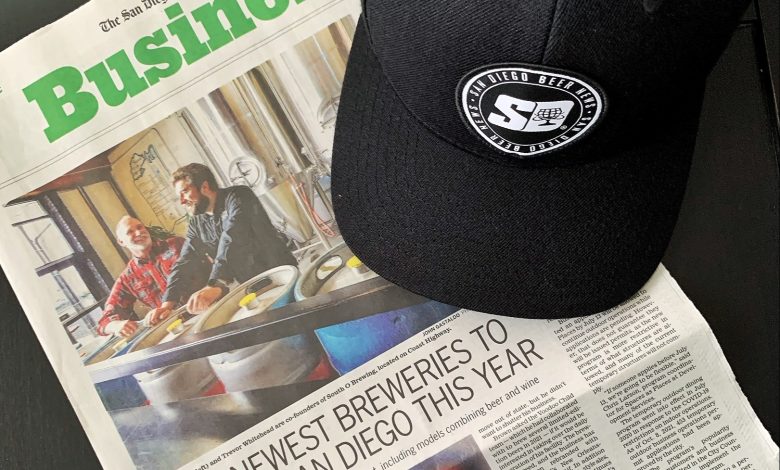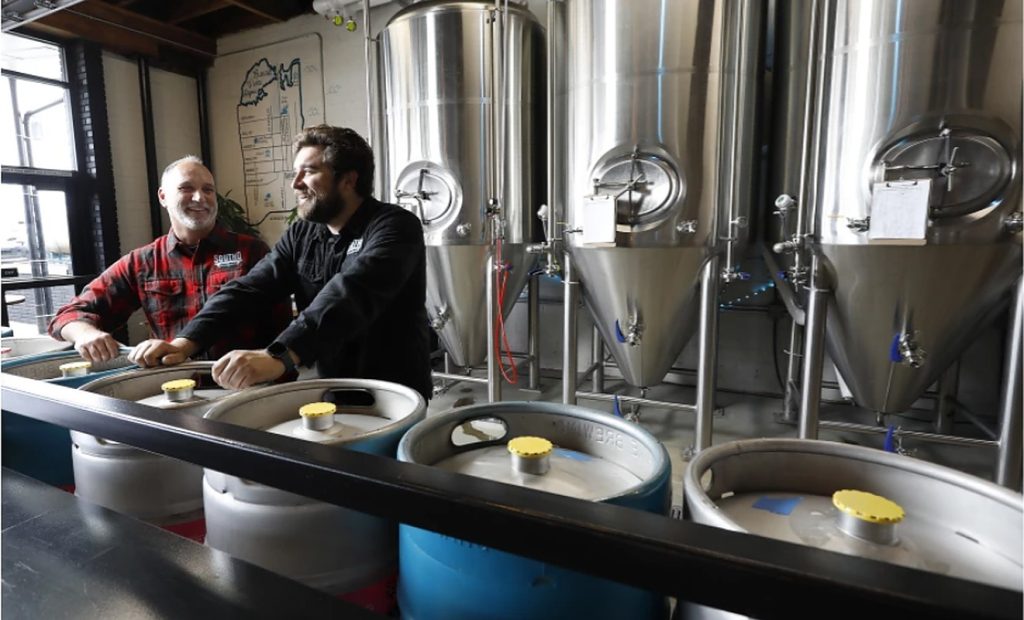
New breweries are nothing new to San Diego. Over a dozen new beermaking operations have opened, on average, over the past seven years. About a half-dozen have debuted so far this year with an astounding four opening over a 40-day period between April and May.
At least as many are poised to come online over the next several months, but it’s far from business as usual. Brewery owners are exploring a plethora of new avenues for entry into the market, some of which are brand new to the local industry.
An alternating alternative
So far this year, only Bill Carter has gone the traditional route, taking over the former home of The Sand Crab Restaurant in Escondido to install his passion project, Backyard Brewery. A maintenance mechanic at Palomar Medical Center and homebrewer of 15 years, Carter opened to the public on April Fool’s Day, debuting an assortment of IPAs augmented by English- and Belgian-style ales. Those beers are brewed on a nano-sized one-barrel system and sold exclusively at the brewery. It’s a straightforward, familiar tale of engineering-minded amateur-gone-pro that now registers as something of an anomaly.
The collegial trio of homebrewers behind Voodoo Child Brewing started out looking for a spot all their own but ended up being led down a road less traveled when Savagewood Brewing owner Darrel Brown asked if they’d like to enter into an alternating proprietorship. After helming the Scripps Ranch brewery for five years, Brown and his family decided to move out of state, but he didn’t want to shutter his business.
Brown asked the Voodoo Child team — which he’d collaborated with to brew several limited-edition beers in 2021 — if they’d be interested in taking over the daily operation of his facility. They agreed and the business has since been rebranded with Voodoo Child’s New Orleans-meets-tiki bar motif. In addition to their own IPAs and UK-style ales, the Voodoo Child team continues to brew some of Savagewood’s more popular beers.
“Starting from the ground up would have been a long road for us. Being able to jump in and contribute to the business in a short time frame was a big consideration and a positive,” says Voodoo Child co-founder Jake Deardorff. “When thinking about sharing space, most would immediately consider the money aspect, but besides sharing costs, we are also sharing customers and clientele. We have already seen people that we know through other avenues starting to get to know many of the existing regulars. That is great, not only for the business but the community.”
Despite producing beers for two brands, Voodoo Child has the capacity and the willingness to contract-brew, using their equipment to manufacture others’ recipes. This has allowed another new brewing interest to bring its products to market. Going by the name Paradise Hills Brewing, it’s the brainchild of Khris Astudillo, the chef-owner of National City Filipino restaurant Serbesa (Tagalog for “beer”).
In early 2020, Astudillo was working with North Park combination brewery and homebrew-supply store Home Brewing Co. to contract-brew and debut Paradise Hills’ beers. The pandemic laid waste to his rollout, but he decided to give it another go earlier this year. There was just one problem. Home Brewing Co.’s owner, George Thornton, had downsized his brewery, rendering it unable to support contract-brewing operations.
Thornton pointed Astudillo in the direction of the Voodoo Child team, which agreed to brew batches of PHBC’s Filipino-inspired beers for him. The first two—a calamansi (citrus fruit indigenous to the Philippines) IPA and Filipino-style adjunct lager — were released over the past month, with more on the way.
An existing beermaker, Little Miss Brewing, is also looking to establish an alternating-proprietorship agreement. The company recently acquired a 30-barrel brewing system but lacks room at its Miramar headquarters to set it up, so owner Greg Malkin is inviting inquiries from brewery owners who either have room at their facilities or are open to leasing a shared space with Little Miss. In both situations, the aforementioned brewhouse will be shared by both companies, allowing each to significantly increase their production capabilities.
Buying and leasing
In 2019, Chicago-based Kings & Convicts Brewing made headlines when it purchased Miramar-based Ballast Point Brewing from Constellation Brands. The latter multinational conglomerate had famously acquired the former San Diego brewing stalwart for $1 billion in 2015 but failed to capitalize off that pricey buy. Following the acquisition, Kings & Convicts scrapped plans to expand its small Windy City brand to Wisconsin, instead moving its operation to San Diego and brewing small, sporadic runs of its beers at Ballast Point.
This January, wanting to expand production of Kings & Convicts products and in need of a large enough brewery to do so, owners Brendan Watters and Chris Bradley jumped on the opportunity to purchase the 50,000-square-foot Saint Archer Brewing facility shortly after parent company MolsonCoors discontinued the brand. MolsonCoors followed the trend of “Big Beer” corporations buying independent craft breweries, purchasing Saint Archer in 2015. And just like Constellation Brands, despite big investments and flashy marketing, MolsonCoors was unable to find success with Saint Archer.
Located on Distribution Avenue, less than a mile from Ballast Point’s Miramar base of operations, the tasting room at the former Saint Archer brewery has been revamped and redecorated to convey Kings & Convicts’ rough-and-tumble, pub-like thematic. The same transformation has taken place at a Leucadia tasting room on Coast Highway, which was included in the deal. Behind the scenes, the majority of Saint Archer’s employees, including the entire brewing team, remained on board following the acquisition.
Kings & Convicts’ strong financial backing is something of a rarity in the craft-beer industry. For the most part, businesses, especially new interests, are looking for the most economical path to entry. Such is the case with a pair of startups: South O Brewing and Seek Beer Co. The owners of both opted to go with the lease-to-brew option presented by H.G. Fenton’s Brewery Igniter model, wherein the local developer rents out units equipped with brewhouses, fermentation tanks, cold refrigeration, tap systems and tasting rooms to new and established breweries.

The Brewery Igniter model allows new operations to hit the ground running and avoid steep startup costs such as purchasing pricey equipment. It also allows existing brewing companies an option for increasing production. The model has proven successful for a number of new companies. Pure Project Brewing and Eppig Brewing easily proved their concepts from Brewery Igniter’s Miramar and North Park campuses, respectively. Both are now headquartered at 10,000-plus square-foot production facilities in Vista and operate satellite tasting rooms. Similarly, Rouleur Brewing proved its concept from Brewery Igniter’s two-suite campus in Carlsbad, eventually taking it over on a permanent basis before opening a tasting room in North Park and teaming with the Cohn Restaurant Group to run the large brewery at its Draft Republic location in San Marcos.
South O became the inaugural tenant of Brewery Igniter’s Oceanside suite. Founded by a pair of South Oceanside residents (pictured above, hence the company’s name), it debuted in December offering an array of mostly sun-friendly ales and lagers. Seek Beer Co., the product of a veteran brewer who most recently directed production at Urban South Brewery’s Houston brewpub, opened in April at the suite that formerly housed Eppig. Replete with Seek’s red, gold and turquoise color palette, the tasting room is stocked with a variety of sour, hoppy and hazy offerings.
Beer and wine under one roof
In October 2019, the State of California passed Assembly Bill 1825, making it legal to produce beer and wine on the same premises. This opened the doors for brewing companies and wineries to manufacture and sell their goods under one roof. The first local instance of this debuted at Hangar 76. A reimagination of Carruth Cellars’ Oceanside production facility, the 17,500-square-foot space now features tasting bars for that company as well as brewery tenant, Tipping Pint Brewing.
“When AB 1825 passed, it was a no-brainer. So many times, you see a couple trying to figure out where to go, with one wanting beer and the other wanting wine. Here we can accommodate both,” says Tipping Pint founder and head brewer Adam Jester. “We’re also focusing more on families. We want to make a welcoming space for both adults and children. Having a couple of small kids helps you realize how many places are hard to frequent.”
Jester hails from the Pizza Port family of brewpubs. At Tipping Pint, he is serving lagers, a honey ale and various IPAs, all of which can be enjoyed in combination with Carruth’s wines on a shared back patio with a stage for live entertainment.
Another operation made possible by AB 1825, CoLab Public House, is on pace to open to the public on June 10. Located just off State Route 78 on Industrial Court in Vista, the 12,500-square-foot, two-story facility will serve the liquid wares of three brewery tenants—Barrel & Stave Brewing, Breakwater Brewing and Laguna Beach Beer Co.—plus vino from Propaganda Wine Co. with food from an in-house kitchen operated by Baby’s Badass Burgers.
This article originally appeared in the Business section of the Tuesday, May 31, 2022 edition of The San Diego Union-Tribune

